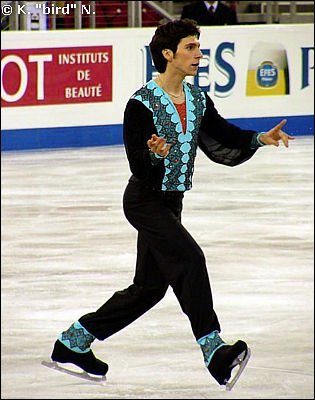"The only important thing is to
improve"
- A chat with Gheorge Chiper
Part II
by Helga Dobor
photos © K.
"bird" N. & Helga
Dobor
You also placed very well at the Eric
Bompard Trophy in Paris last November (5th place). The skaters
who placed before you were in the top 5 at Worlds in Dortmund
in 2004. What did you think of this competition?
Gheorghe: It was a hard one! Before Paris I competed at Skate
Canada, and I wasn’t too successful there (12th), so
afterwards it was hard to motivate myself to go on. Although
it was important that I be satisfied with my performance,
I was not focusing on finishing in a certain place. But when
in the end I was the second European skater, after Joubert,
I thought it was a positive sign before Europeans! Every competition
is unique and you can’t afford to settle in complacency.
You always have to push to get better.
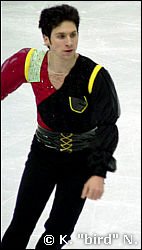 |
What is your opinion of the new
judging system? |
One goal of the new system is to avoid predictable
results, but isn’t everything the same now too?
Gheorghe: No. Now at least you can see technically that ok,
there I lost points, but here I gained points. Then with the
second mark, the components, yes, not too much has changed.
If I see that the difference in the previous group is 10-15
points, but only in the components, it is very hard to make
it technically from there. We'll see. I think there won’t
be any major change before the Olympics, but perhaps afterwards
some parts will be changed. There still needs to be changes
made!
Who do you think could be a good skater in Romania?
Gheorghe: In Romania everything is hard. People have no money
to skate and if they had money, they wouldn't spend it on
skating. As a skater in Romania I wouldn't be able to reach
very far. This is a big problem, not only in Romania, but
also in the surrounding countries. It is not like in Russia,
where when you have good result you can do anything. In Romania,
even with the same result, you wouldn't be able to start anything.
Are you popular in Romania?
Gheorghe: I don't know! Sometimes I hear that some newspapers
write about me, and sometimes a radio station calls, but really,
I can't answer this question!
During the European Championship 2004 in Budapest,
somebody brought your daughter Flora to you. This sweet moment
moved the audience to tears as everybody saw how important
your family is to you. Would you tell us about them?
Gheorghe: About my family? I don't want to involve them in
the business of skating.
You mean involve them even more? |
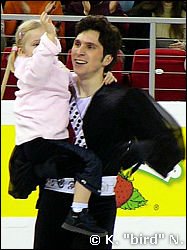 |
Do
you want Flora to become a skater?
Gheorghe: I don't want
Flora to become a skater! I know all aspects of a skater’s
life very well, and what it takes to become good. To have
the whole family in skating is very hard. I don't push her
to go skating, but she likes it. She wants to be on the ice;
we just came back from the rink now, we had a great time there.
Once Flora is on the ice, you can’t get her away. She
really likes to be there, and as long as she feels that way
we support her. But we don't say she has to be a champion
or she has to go to practice. If she wants to do it ok, we’ll
help, but if she doesn't want to, it’s also ok.
What do you wish for her in life?
Gheorghe: She is only five years old, so it is a hard question,
I can't really say. I want her to grow up well and be healthy;
the other things aren't so important right now. When she’s
18 it’ll be a different story...
How many languages do you speak, and which ones?
Gheorghe: Officially? *smiles* Seven languages. I should know
seven languages. It's another issue whether I can actually
still speak these languages or not.
Your Hungarian is great!
Gheorghe: I started to forget Hungarian. It’s very hard
for me since I don't speak it much. But do you know Bálint
Miklós?
Yes, of course. Your teammate.
Gheorghe: He is now in Switzerland too. He studies there at
a University. I talk to him in Hungarian and to my mother,
but other than that not too much. I speak Romanian, Hungarian,
French, English, Italian, Dutch and German. Yes, now I try
to speak German, Swiss German, but it’s very different
from real German. I never learned German in school, what I
know I picked up here and there; from my family, my daughter,
the kids when they are chatting on the ice. I am trying to
put the pieces together.
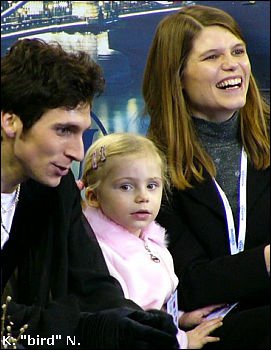 |
Which languages do you speak
at home? So Flora listens to at least three languages
every day? |
What languages did you use at home when you grew
up?
Gheorghe: I talked to my mother in Hungarian and to my father
in Romanian. I spent a lot of time at my grandmother’s
(mother’s side). We were always there during the summer
holiday, so I talked a lot in Hungarian. It was normal because
there are lots of Hungarians in Csikszereda. You have to know
Hungarian or you cannot live there. At the Csikszereda rink
everybody spoke Hungarian. There were only two or three Romanian
skaters - the others were Hungarian, so it was essential to
speak the language.
Do you consider yourself Romanian or Hungarian?
Gheorghe: I am Romanian, as my mother is also Romanian- she
just happens to be a Hungarian minority. Others have different
opinions, but I feel Romanian.
So Romanian is your mother tongue?
Gheorghe laughs: My father tongue you mean? Yes, it is.
Since you speak the language, what is your relationship
to the Hungarian skaters?
Gheorghe: It’s the same as with the Romanians. I have
a good relationship with almost all skaters. I can say we’re
friends. I think it’s important that everyone can talk
to each other, it widens our perspective. Some years ago,
when the Russian skaters didn't speak English, everyone thought
they were so strange. When you can't communicate with somebody,
you usually don’t become friends. As I learned more
languages I could talk to more skaters, and since the Russians
started learning English I can communicate with them too.
I have good relations with everybody.
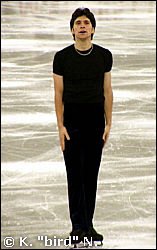 |
And where did you learn all these
languages? |
So you went to the Netherlands without knowing a
word of Dutch?
Gheorghe: Yes! I really didn't know any of the language before
I started my studies at the University. I went to register
and I didn't understand a thing. Then I went home and read
the curriculums again. I had to look up every other word in
the dictionary; it was really, really hard! I had 10 months
to learn, because if I didn’t pass the language exam,
I wouldn’t be allowed to continue my studies. So I took
language courses, but I also had to train, and there was my
family... I spent 10-12 hours a day studying, so you can imagine
how hard it was for me to learn Dutch. I had to pass my exams
at the University too, and these were hard. After I learned
Dutch, we left Holland and went to Switzerland, and everything
started over again. I’m now learning German.
What did you study at the University?
Gheorghe: Physical education.
What are your plans for the future?
Gheorghe: The children are always there and I want to work
with them. About my own career... First I want to qualify
for the Olympics, and do everything I can to prepare. What
I will do after the games is another question. After the Salt
Lake City Olympics there was some trouble with the Romanian
Federation and I didn’t skate for 6 months. Then they
approached me again and asked me to continue skating. I agreed,
let's do it, but the conditions must change. The 2006 Olympics
are coming, and they should expect results from me, right?
So we’ll see. I take each day as it comes, one at a
time.
